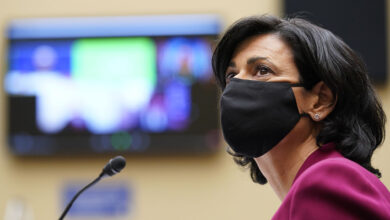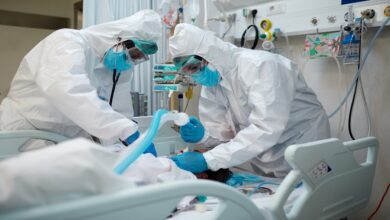‘No evidence’ NYC coronavirus variant impacts vaccines, causes severe illness: official

[ad_1]
A New York City health official on Thursday said there is no evidence showing the newly reported coronavirus variant, B.1.526, is driving trajectory of infections, reduces vaccine efficacy or results in more severe illness.
“We don’t have any evidence at this point [that] this New York variant, the B.1.526, is what is contributing to the trajectory of cases, which we should emphasize continue to decrease,” Dr. Dave Chokshi, New York City health commissioner, said during a briefing Thursday.
The comments come after researchers from Columbia University and the California Institute of Technology each posted early findings on the variant this week ahead of peer-review. Among other results, scientists found the variant included a E484K mutation. This specific mutation on other variants has been a cause for concern regarding impact on vaccine efficacy.
PFIZER COVID-19 VACCINE 94% EFFECTIVE IN REAL-WORLD CONDITIONS: STUDY
Variants have come under significant concern in recent months because some evidence has shown strains first detected in the U.K. and South Africa had diminished vaccine efficacy, though the vaccines are still believed to remain effective. Companies like Pfizer and Moderna are now testing variant booster shots to increase protection amid the circulating strains.
“We also don’t have any evidence at this point that the variant is concentrated in certain parts of the city,” Chokshi continued, adding that the science around the variant is “less established” compared to the U.K. B.1.1.7 variant for example. He said the studies, while important, “remain quite exploratory with respect to the real-world effects.”
“Whether it’s a new strain that spreads more easily or causes more severe illness or reduces vaccine effectiveness, we have no indication that that’s the case yet so we’ll continue to collaborate with our partners on those important scientific questions,” Chokshi said.
Dr. Jay Varma, senior advisor for public health at Office of the Mayor of New York City, said the variant will be considered a “variant of interest” for now (as opposed to a “variant of concern”), adding “it doesn’t change anything about our public health concern, we need more data and studies to understand that.”
CLICK HERE FOR FULL CORONAVIRUS COVERAGE
The comments come after Kristian Andersen, a virologist at the Scripps Research Institute in San Diego, uninvolved with the studies, told the New York Times, “Given the involvement of E484K or S477N, combined with the fact that the New York region has a lot of standing immunity from the spring wave, this is definitely one to watch.”
Public health officials say mitigation measures like mask use, maintaining proper distance, hand hygiene and prompt vaccination when available are all key steps to prevent the emergence of variants and avoid infection.
“Until there’s evidence that tells us that a variant is not handled well by vaccine, for example, or a variant has different impacts, we shouldn’t assume the worst, we should say we need the full truth, we need the facts,” Mayor Bill de Blasio said.
[ad_2]
Source link



